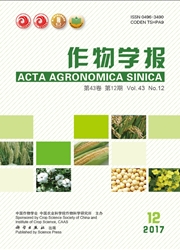

 中文摘要:
中文摘要:
谷物胚乳性状是决定谷物品质的一类重要性状。由于胚乳是由雌性的两个极核和雄性的一个精核受精发育而形成的三倍体组织,因此胚乳性状的遗传基础要比通常的二倍体农艺性状复杂得多。本文根据三倍体胚乳性状的数量遗传模型,提出利用分布于染色体上的所有分子标记对胚乳性状数量基因座位(QTL)进行区间作图的极大似然估计方法。该方法以分离群体中各植株的分子标记基因型以及植株上若干粒种子胚乳性状的单粒观测值为数据模式进行QTL分析。由于该方法充分利用标记基因型内QTL基因型的混合分布特性,因此,它不仅可以精确定位控制胚乳性状的多个QTL,同时还可估计各QTL的两个显性效应。通过计算机模拟数据分析进一步验证了方法的可行性和有效性。
 英文摘要:
英文摘要:
Endosperm traits are the kind of important traits determining the grain quality in cereals. The endosperm, which is derived from two polar nuclei fusing with one sperm, is a triploid tissue whose genetic constitution is more complex than common diploid tissue. However, current statistical methods for mapping quantitative trait loci (QTL) under diploid genetic control have not been effective for dealing with endosperm traits. Based on the quantitative genetic models for triploid endosperm traits, a new maximum likelihood method implemented via EM algorithm to map QTL underlying endosperm traits was proposed in this paper. The method was established using the DNA molecular marker genotypes of each plant in segregation populations and the single endosperm observation of a few endosperms of each plant. Because of using the mixture distribution property of QTL genotypes within flanking marker genotypes, the method could not only precisely map QTL of endosperm traits, but also estimate two dominance effects of endosperm traits. Efficiency and feasibility of the methods have been verified through Monte Carlo simulation studies. The means and standard deviations of the estimated QTL effects and locations as well as the empirical powers under different QTL heritabilities and sampling strategies were listed in Table 2. These simulation results show that the proposed method provide accurate estimates of beth the QTL effects and locations with high statistical efficiency. The next step of endosperm mapping is to consider beth the maternal diploid genotype and the triploid endosperm genotypes jointly.
 同期刊论文项目
同期刊论文项目
 同项目期刊论文
同项目期刊论文
 期刊信息
期刊信息
